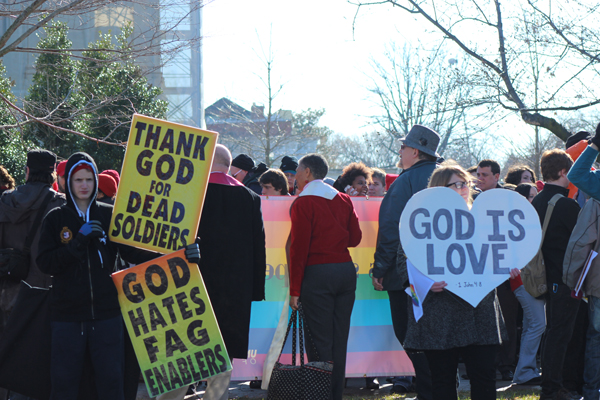Did anyone ever worship God at Westboro Baptist Church?
Did founder Fred Phelps, or anyone in his family who formed the core of the tiny congregation, ever bring the power and beauty of the gospel to life for Christian believers? Pray along with someone in need of spiritual support? Or bring food to the hungry? Or join community efforts to care for the least and the lost?
Or did Fred Phelps — now ill according to a church spokesman, perhaps dying according to his estranged son, Nate — devote all his days of strength and health to just one thing.
Hate.

Westboro Baptist Church members display their signs in front of the U.S. Supreme Court in 2010. The Church won its free speech case in the ruling issued in 2011. RNS photo by Adelle M. Banks
For nearly two decades, Phelps and a tiny squad from Westboro, traveled to military funeral and every other event they thought might glean public attention, toting signs proclaiming God’s wrath against America for tolerating homosexuality. They would stand, in a designated protest area on public property with their well-worn signs: “Thank God for Dead Soldiers” or “God hates fags” or “You’re going to hell.”
And, in 2011, the U.S. Supreme Court issued a ruling that they were within their Constitutional free speech rights to do exactly that. (My colleague Brian Pellot asks if gays should picket Phelps funeral.)
In the high court case, a father, Albert Snyder, argued that Westboro’s signs inflicted deep emotional distress at the funeral of his soldier son, Marine Lance Corporal Matthew Snyder, who was killed in Iraq in the line of duty. But the court found that the pickets did not disrupt or alter the funeral, however hurtful the speech or whether “its contribution to public discourse may be negligible.”
The majority ruling concluded:
“Speech is powerful. It can stir people to action, move them to tears of both joy and sorrow, and—as it did here— inflict great pain. On the facts before us, we cannot react to that pain by punishing the speaker. As a Nation we have chosen a different course—to protect even hurtful speech on public issues to ensure that we do not stifle public debate. That choice requires that we shield Westboro from tort liability for its picketing in this case…”
So, will Fred Phelps spend his days, possibly his last, with peace of mind that he has secured a safe corner for hate speech?
Does it worry him that no one else jumped on the Westboro hate bandwagon to bolster his ranks?
Is two decades of loathing, not loving, his country and those who serve it, this the legacy he will triumph in when he faces the judgment of God?
That seems to me a spiritual contradiction to believe in an almighty God of judgment and still assume that Lord expects puny humans to do His job.
Unlike Fred Phelps, I do not wish him illness or death. But I don’t mind if he’s silent now. Do you?





